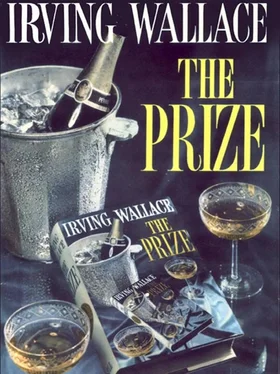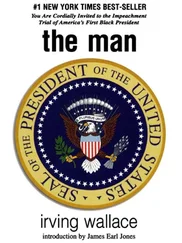‘Yes, but in your words, no matter how briefly-’
‘Very well. I was at the Istituto, early one afternoon, preparing to transplant a mammalian heart into a St. Bernard dog, for the benefit of foreign physicians en route to Milan for a medical convention. In the midst of my preparations, I was informed of an important emergency case. The patient, in his seventies, was a great international figure. He was an English expatriate, a playwright, who had known James McNeill Whistler and Oscar Wilde and Lily Langtry, and for some years had been living in Ravenna. He was on a business visit to Rome, and he had suffered a coronary thrombosis only a few blocks from the Istituto. I rushed to save him, but there seemed little hope. His common-law wife, an Italian lady from a titled family, a lady I had met socially and who had attended my lectures, knew of my dreams and begged me to replace her playwright’s dying heart with the mammalian one I had ready for my exhibition experiment. Even as she signed the release, and my equipment was being set up in surgery, the playwright expired on the table. I had no more than five minutes to open his chest and begin a cardiac massage, while my anesthesiologist established an airway. When the patient had first been wheeled in, expiring, I had been frightened. But now that he was dead, all hesitancy left me. I worked like ten demons. Massage immediately reactivated his heart, his breathing, so no brain damage was incurred. Next, I put into use the cardiopulmonary bypass machine. After ninety minutes, I was able to effect the transplantation of the new mammalian heart into his chest. I then connected his circulatory system to the new heart, closed his chest, and resumed treatment with my anti-reactive drug. In three months, he was on his feet-and just before coming to your gracious city I received, by air post, an advance copy of his latest play-his best yet!’
The Stockholms-Tidningen lady clapped her hands, and several other reporters joined in applause.
Farelli cast his eyes downward, modestly, and then he looked up. ‘That was my first case. Since then, I have made twenty additional human heart transplantations, on qualified patients, and I am proud to say that there has not been one failure. So much for my work. Now, I am certain, you would like to hear my fellow Nobel laureate tell you about his.’ He opened his hand towards his companion on the sofa. ‘Please, Dr. Garrett-’
The sudden invitation to share honours and newspaper space had caught Garrett completely off guard. He had been dazzled by Farelli’s account, and felt shrunken and wizened after the applause. Now, to follow Farelli was as impossible as to conclude a story that had been half told by Scheherazade.
‘I-I don’t know if-’ He found himself speaking to Farelli, and he realized that this was all wrong. He faced the reporters, and imagined that he saw impatience, even hostility, in their faces. Desperately, he sought a thread of coherent narrative. ‘I was in the hospital in Pasadena-it’s in California-I had my calf’s heart and had been working on a canine specimen-it was late, after dinner-this truck driver-sixty-seven-Henry M., I called him in my paper-I made the heterograft of the organ-and he’s alive today. It was-there were obstacles, still-’
Garrett became aware that one reporter, not listening to him, had completely turned his back to consult with another reporter behind him. He heard the rustling of paper. There was an excessive amount of coughing. A chair scraped the floor. They wanted Scheherazade, Garrett knew. The inattention flustered him. He was defeated.
‘-anyway, it was a gratifying experience, and the reception was gratifying, and I was gratified.’ The record needle was stuck and Garrett wanted to quit. He quit. ‘That was my first case,’ he concluded lamely.
The waiter appeared with his tray of drinks, to which cigarettes had been added. Farelli accepted a sherry, and, dazed, Garrett took one, too, though he detested the drink. The waiter circulated among the press, and Farelli sipped his sherry, and Garrett did the same.
Garrett tried to think. Had Farelli deferred to him, offered him the chance to state his own case, out of geniune respect? Or had the Italian been sensitive to the fact that he had been putting on a one-man show and felt a pang of guilt? Or had the Italian elected to display his superiority by deigning, on his terms, at his command, to allow a lesser royalty to speak?
Considering Farelli’s motive, Garrett emerged from his hypnotic trance, reminding himself that beside him sat the usurper, the rival, the enemy, a crafty Machiavelli of medicine who must be battled word for word, to the death. He had been given an opportunity, moments before, and he had fumbled it badly, out of surprise, out of self-imposed inferiority. This must not happen again, and it would not. Farelli was a braggart, a highwayman, an alchemist. He, Garrett, had been first in the field, first acknowledged and first recognized, and now, because he was humble and kind, he had allowed the Italian to take the lead through dubious forensics. He must sharpen his wits, become a recognized member of the press meeting, and hold his own. He gulped the distasteful sherry, pushed himself to the very tip of the sofa, like an anchor man on a relay team awaiting the baton, and poised himself for the next questions.
A distant hand went up. It belonged to the Il Messaggero man from Rome. ‘Dr. Farelli, did you and Dr. Garrett work together, and if so, to what extent?’
‘I will answer that!’ Garrett shouted, and then, horrified at the loudness of his voice and at the suddenness with which he had attracted the attention of the whole room, he modulated his next utterance to a whisper. ‘We did not work together at all.’
Farelli waited until he was sure that Garrett had nothing more to say, and when he was sure, he added his own comment, addressing the reporters. ‘Dr. Garrett and I, unfortunately, never set eyes upon each other until one hour ago. We never corresponded. We knew nothing of the progress or details of each other’s work-except, of course, what we read in the scientific journals.’
‘Is that not unusual?’ asked the Il Messaggero man.
‘Not at all, not at all,’ said Farelli. ‘There are many examples, in science, of similar parallel researches. I will submit two examples. Years ago, in Rochester, Minnesota, a biochemist, Dr. Edward Kendall, worked on secretions of the adrenal glands. At the same time, in Basle, Switzerland, another biochemist, Dr. Tadeus Reichstein, also worked on adrenal glands. By 1936, both biochemists, independent of one another, had discovered a new hormone, the same one, which later led to cortisone injections for arthritis. In 1950, these two men, and a third, Dr. Philip Hench, made a three-way share of the Nobel Prize in medicine for “discoveries relating to the hormones of the adrenal cortex”. Similarly, in 1956, Dr. Nikolai Semenov, of Soviet Russia, and Sir Cyril Hinshelwood, of Great Britain, won your chemistry prize, shared it, for work in the field of reaction rates-the mechanism of chemical reactions-although they experimented separately, far apart, but going along on the same researches.’ He paused. ‘You see, it happens. Dr. Garrett and I are not so unusual.’
‘Gentlemen, we are all wondering about the future,’ said the Associated Press man. ‘What will your heart transplant eventually mean to all of us and our children?’
Garrett was not certain if Farelli had deferred to him once more, and politely held back, or if he, himself, had merely leaped to the reply more rapidly. In either event, he had not given himself time to consider the question before answering it. His only objective now was to have the floor on his own. ‘That-that is a difficult question,’ Garrett began, ‘because it requires a prediction.’ He would make a joke. That would even him up with the Italian. He made the joke. ‘After all, Nostradamus never won the Nobel Prize.’
Читать дальше












